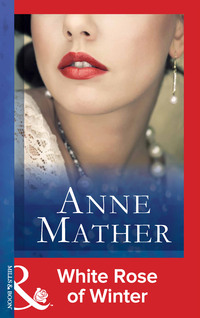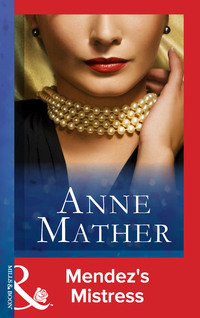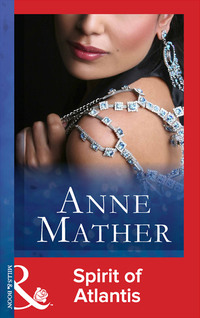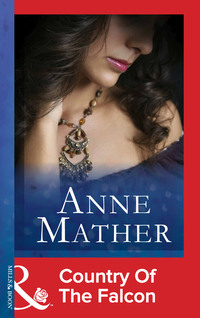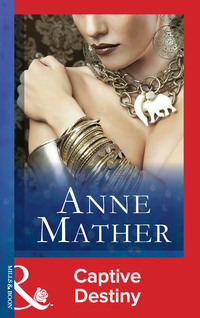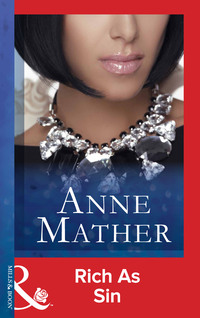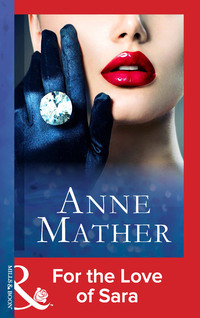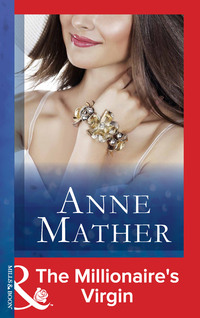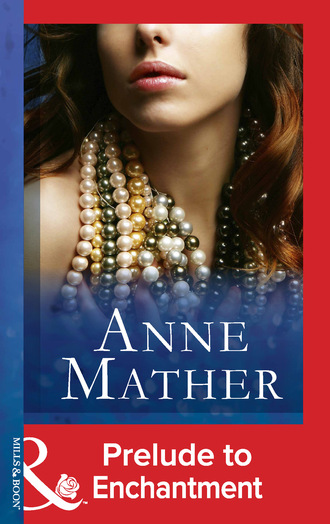
Полная версия
Prelude To Enchantment
‘Count Malatesta,’ she murmured incredulously. ‘Buon giorno, signore.' She glanced about her hastily. ‘Were you—I mean—are you on your way to see my uncle?'
The Count allowed the corners of his mouth to quirk humorously. ‘Now why should you imagine I might be coming to see your uncle?’ he queried.
Sancha shook her head, her hair swinging curtain-like against her cheek. His unexpected appearance had startled her and she had said the first thing that came into her head. In a cream silk lounge suit and matching shirt he was devastatingly attractive and his eyes surveying her so thoroughly held a most disturbing glint.
‘If you'll excuse me——’ she began now, beginning to move away, but he stopped her, his long fingers curving coolly about the flesh of her upper arm.
‘Don't go, signorina,’ he commanded gently. ‘I came to see you!'
Sancha quivered. ‘To see me, signore?'
‘Si, to see you, signorina. Now tell me, you will have lunch with me, will you not?'
Sancha was flabbergasted. ‘Ha—have lunch with you?’ she echoed weakly.
He half smiled. ‘Is it an English characteristic to repeat everything that is said to them?’ he enquired mockingly.
‘Yes—no—I mean—of course not!’ Sancha wished he would let go of her arm. His grip was not cruel and yet she sensed if she tried to pull away it would tighten painfully. For all his charm and gentility, she somehow knew that he demanded, and usually got, his own way. Wetting her dry lips with a rather unsteady tongue, she went on: ‘I'm afraid that's out of the question, signore. I—I only have an hour and——'
‘I am not such a big eater that an hour will not suffice,’ the Count observed dryly.
‘I—I didn't think you were.’ Sancha bit her lip. ‘I—look, signore, there is absolutely no need for you to take me to lunch. If—if you had arrived a few moments later I would have been gone.'
He shook his head. ‘No.'
‘No?’ Sancha frowned bewilderedly.
‘No, signorina. I have been waiting for you for some time.'
‘W—waiting for me?’ exclaimed Sancha, and then realised she was repeating him again. ‘I—I—but why?'
His eyes narrowed. ‘I wished to offer you my escort to lunch. What else?'
Sancha was hopelessly lost. It was bad enough encountering him like this and having him disconcert her to the point of confusion, but to actually hear him state that he had arrived with the sole intention of taking her to lunch was simply too much. Things might be different here, but in England members of the aristocracy simply did not arrive to take junior reporters to lunch—unless they had an ulterior motive, of course. She looked at him curiously, trying to gauge what his motives might be, and then gave it up. Count Malatesta was far too sophisticated and experienced to allow her to read his thoughts.
Desperately she sought about in her mind for some reason why she should not lunch with him. It seemed imperative that she should find one. Used as she was to dealing with the young men in the office she still knew that the Count Malatesta was an entirely unknown quantity and some inner sense of self-preservation urged her not to become involved with him.
And yet, for all that, an inner demon of pure feline origin urged her to accept if only for the satisfaction she would gain when she told Eleanor Fabrioli where she had been.
Squashing this thought, she said: ‘I—I'm afraid that's impossible, signore.'
The Count's fingers slid down over her elbow to her forearm with almost caressing insistence. ‘Why is it impossible?’ he asked huskily. ‘You are hungry and wish to eat, and so do I. Can we not eat together?'
In truth Sancha felt that food would choke her. She was overwhelmingly conscious of the pad of his thumb moving over the veins in her forearm and quivering awareness of him was invading every part of her being.
‘Excuse me,’ she said tautly, and as though he had suddenly become bored with the whole business she was free.
‘Very well, signorina,’ he said, his blue eyes like shafts of ice burning into hers. ‘Arrivederci!' and he strode away towards the bustling heart of this commercial quarter.
Sancha stood where he had left her for several minutes, too bemused and unsteady to trust the use of her legs. What had it all meant? Why had he come? What possible reason could he have had for wanting to take her to lunch?
She swallowed hard. Well, whatever his reasons he had gone now and she could only hope that she had not offended him. Her uncle would not be at all pleased if the article was jeopardised because of this.
Whenever the telephone shrilled during the next few days Sancha listened apprehensively for some violent explosion from her uncle's office, but happily nothing untoward happened and she was allowed to get on with the feature in peace. The day after she had met the Count outside the offices she had emerged at lunchtime with some trepidation, half afraid he might be there again, and experienced a kind of regret that he was not.
Life resumed its normal pattern. Eleanor was her usual objectionable self, but even she looked with evident interest at the photographs Tony had taken of the inside of the Palazzo Malatesta when he brought them to show Sancha.
‘Che peccato!' she exclaimed, when she saw how dampness was destroying the priceless murals on the walls of some of the apartments. ‘Is there no way of halting such a disaster?'
Tony shrugged. ‘Not unless the Count marries a rich woman,’ he replied cynically.
Eleanor glanced at him. ‘Is that likely?'
Tony's eyebrows lifted. ‘Well, he's young enough, and I have heard rumours that he's been seen in the company of that French millionaire and his daughter—what are their names?—Rumon, Roman?'
‘Rumien,’ put in Eleanor thoughtfully. ‘You do mean the perfumiers, don't you?'
‘That's right.’ Tony nodded. ‘Of course, his book could always become a best-seller, couldn't it, Sancha?'
Sancha hunched her shoulders. ‘I suppose so.'
‘But most unlikely,’ said Eleanor, shaking her head. ‘It was not the easiest book to read.'
‘It was history,’ remarked Sancha quietly, and they both turned to look at her so that she coloured defensively. ‘Well,’ she added awkwardly, ‘I mean it. I read it again, remember, and taken in the context in which it was written it's very good.'
‘Do I detect a fan?’ queried Tony, leaning on her desk, laughing at her.
Sancha cupped her chin on one hand. ‘All I'm saying is that I enjoyed it the second time. It does what it sets out to do—educate!'
Eleanor's dark eyes flashed contemptuously. ‘Tell me, Tony,’ she said, ‘what was this Count Malatesta like? He seems to have made a distinct impression on our Miss Forrest.'
Tony chuckled. ‘Maybe you're right, Eleanor. He was a most attractive individual, I must admit.'
‘Oh, stop it, you two!’ exclaimed Sancha impatiently.
‘I really think our Miss Forrest is smitten with Count Malatesta,’ Eleanor insisted maliciously. ‘Perhaps she hopes to impress him with her literary tastes.'
Tony gave Sancha a slanted look. ‘Do you think perhaps, Eleanor, she is hiding something from us? Maybe the Count secretly fell in love with her and they are at present conducting an illicit liaison——'
Sancha's cheeks burned. ‘Have you nothing better to do than stand here making ridiculous remarks?’ she demanded hotly.
Eleanor's expression was one of spiteful satisfaction. ‘Dear me, Tony, I do believe our Miss Forrest is nurturing a hopeless passion for the Count. Do you think we should tell him and put her out of her misery——'
Sancha got abruptly to her feet, anger overwhelming all other emotions. ‘Don't judge everybody by your own standards, Eleanor,’ she stated clearly and distinctly, her voice carrying to every corner of the huge office so that several pairs of eyes turned in their direction. ‘We're not all man-eaters, you know.'
For a moment there was complete silence and even Tony looked slightly uncomfortable, and then Eleanor almost spat out her next words: ‘You—you little bitch!’ she stormed. ‘Don't you dare to speak to me like that, or uncle or no I'll have you thrown out of this building!'
‘What is going on?'
The cool precise tones of Eduardo Tessile broke into the heated exchange.
Sancha's shoulders sagged and she leant on her desk weakly. Eleanor gave her one scathing glance before turning to the older man.
‘Oh, Eduardo, I am glad it is you,’ she said, her voice softened to a honeyed sweetness. ‘Sancha and I have been having an argument and she has said the most spiteful things to me.’ She shook her head. ‘I do not seem able to converse with her these days.'
Sancha compressed her lips. How dared Eleanor stand there and tell such barefaced lies? She looked at Tony. He must know Eleanor was lying, too, and yet he said nothing.
Eduardo looked at Sancha. ‘Well, Sancha,’ he said, ‘have you nothing to say for yourself?'
Sancha shrugged. ‘Eleanor's right, we don't get on. But I don't agree that it's all my fault.'
‘No. There are always two sides to every argument,’ agreed her uncle, sighing. ‘Nevertheless, for the efficient running of this magazine it is necessary to maintain harmony. Can you not at least save your differences for outside these office walls and make a pretence of co-operating while you are here?'
Sancha lifted her shoulders helplessly, while Eleanor sniffed. ‘Your niece cannot take a joke, Eduardo,’ she said, meaningfully. ‘Tony and I were teasing her, that is all, when she—how do you put it—flew from the handle!'
Eduardo shook his head and it suddenly became obvious to Sancha that while he might sympathise with his niece he did not want to offend Eleanor. She was a professional writer and they were hard to come by, and she would find no difficulty in taking her services elsewhere. Even so, Sancha would not have considered her irreplaceable. No, there was more to this than an impersonal desire for a good feature writer. It was something else, something in the atmosphere, something that put a guarded look in Tony Braithwaite's eyes, that enabled Eleanor to adopt an almost aggressive stance, and made Eduardo's voice almost appealing.
It was as though the scales had suddenly been lifted from her eyes, and Sancha wondered why it had never occurred to her before to wonder how Eleanor could get away with so much. The only occasion she could ever recall where Eleanor had not got her own way was over this feature and it must have been galling for her when he insisted on allowing his niece to cover it.
Sancha's probing ceased and she bent her head uncomfortably as she sensed Eduardo's gaze upon her. Had he guessed that she had stumbled upon the truth of the situation?
‘Sancha?’ he said now, questioningly.
Sancha shrugged. ‘What do you want me to say?'
‘Let this be an end to this petty bickering,’ Eduardo replied shortly. ‘Eleanor! I expect you to co-operate, too.'
Eleanor tossed her head indifferently. ‘We shall see what happens,’ she retorted, with careless disregard for his position, and walked away to her own office.
After she had gone Eduardo muttered a word to Tony and then turned and walked back to his own office. After he had gone Tony knocked gently on Sancha's desk. ‘Can I come in?'
Sancha looked up. ‘What is it now?'
Tony sighed. ‘Sorry, kid, but I couldn't help you there.'
Sancha's eyes narrowed. ‘And I know why.'
‘Too bad.’ Tony made an expressive gesture. ‘But that's the way it goes. Don't think too much about it. Your aunt doesn't even suspect, and why should she? Even Eleanor knows better than to brag about it.'
Sancha hunched her shoulders. ‘But why?’ she cried.
‘Why what? Why doesn't your aunt know?'
‘No, you know what I mean. Why?'
Tony glanced round to make sure their conversation wasn't being eavesdropped upon. ‘Who can tell why these things happen?’ he asked. ‘I guess Eduardo was attracted to her and she was flattered by his attentions. Now she seems to imagine she holds a kind of special position here.'
‘And doesn't she?'
‘Only so far,’ replied Tony thoughtfully. ‘You got this feature, didn't you? She didn't want that to happen, but it did.'
Sancha sighed. ‘It all seems so unnecessary somehow.’ She shook her head. ‘My uncle has a wife. Surely one woman is enough!'
Tony chuckled softly. ‘Oh, Sancha, how naïve you are! You frighten me sometimes with your complete lack of—well—knowledge. Men want women for different reasons. Don't try to analyse something about which you know so little. Just let it ride. It's been going on for some time now and no one's been hurt, so don't think about it.'
But after Tony had gone Sancha could not help thinking about it. It was all very well telling herself that it was nothing to do with her and that so far as she was concerned everything was just the same as it was before, but it wasn't! How could she watch Eduardo and her Aunt Elizabeth together without thinking of him with that other woman—with Eleanor Fabrioli? She would never be able to think of Eduardo in the same light ever again …
At the weekend she returned with Eduardo to his house by the shores of Lake Betulla several miles from Venice. Usually she looked forward to these weekends, enjoying the time spent with her aunt, lazing by the shores of the lake or swimming in its lucid depths. But this weekend she was taut and strained, and on the journey to the Tessile house she sensed that her uncle was strained also. Not that he said anything; on the contrary, he maintained a flow of casual conversation which would have fooled all but the most observant, but Sancha was not fooled. Instead, she made monosyllabic replies and was glad when the journey was over.
The Tessile house was quite beautiful. The red pantiles of its roof sloped down to a garden bright with flowers which were her aunt's pride and joy. Surrounding the house which was built on the lines of a dormer villa was a verandah, and it was here that they took most of their meals overlooking the blue sweep of the lake and the shadowed purple of the hills beyond. At first, Sancha had thought her aunt would find the isolation too much for her when she was alone all day, but she soon discovered that Elizabeth Tessile had far too many hobbies and pursuits to ever feel really lonely. She enjoyed gardening; she was an expert at making her own clothes; although she had a housekeeper she enjoyed cooking, and as she had plenty of friends popping in for coffee or her particularly English afternoon tea she seldom had a spare moment.
On Saturday evening her aunt had arranged for them all to attend a dinner party at the home of some friends whose younger members of the family would be company for Sancha, but Sancha declined. She felt she could not spend an evening in her uncle's company, listening to him regaling his colleagues with her aunt's idiosyncrasies knowing full well that he was being unfaithful to her. So she washed her hair instead, and spent the evening writing to her father and stepmother, and to her friends back home in England.
It was almost a relief when Monday morning came and they could drive back to the city.
On the journey back to town, Eduardo said: ‘Sancha, is anything wrong? You've seemed particularly constrained this weekend and I'm sure your aunt was concerned about you.'
Sancha looked up quickly. ‘Oh, surely not,’ she exclaimed quickly. ‘I—I had a headache on Saturday evening, I didn't want to go out.'
‘Was that all it was?’ he probed, glancing her way.
Sancha shrugged. ‘What else could it be?’ she countered.
He frowned. ‘I don't know,’ he said slowly. ‘But perhaps you have been thinking that I neglect my wife——'
Sancha's lips parted in protest and he went on:
‘Elizabeth's world is complete—without anyone else—without me!'
‘Oh, no!’ Sancha stared at him.
‘Oh, yes.’ Eduardo's hands changed gear automatically. ‘She has her sewing, her cooking, her gardening! She has her friends! She has whist clubs and bridge clubs and golfing parties! She doesn't need me—except perhaps as a meal ticket.’ He said it without bitterness and Sancha felt a tremendous feeling of responsibility suddenly. ‘It might have been different if we had had children,’ he added. ‘But we were not lucky enough to be so endowed, and so——’ He spread a hand. ‘Does what I'm saying mean anything to you?'
Sancha bit her lip. ‘I think so.'
‘Good. Good, I'm glad.’ Eduardo gestured towards the sea on their left, the sun turning its waters to a pale rose gold. ‘We have so much to be thankful for, don't you think, Sancha?'
Sancha bent her head but said nothing. Without actually mentioning the subject which was uppermost in both their minds, Eduardo had carefully succeded in explaining to her that sometimes things, and people, were not always what they seemed; that there were faults on both sides, not all of which were recognisable as faults.
It didn't excuse him; nothing could do that. But she appreciated his confidence and his perception.
Конец ознакомительного фрагмента.
Текст предоставлен ООО «ЛитРес».
Прочитайте эту книгу целиком, купив полную легальную версию на ЛитРес.
Безопасно оплатить книгу можно банковской картой Visa, MasterCard, Maestro, со счета мобильного телефона, с платежного терминала, в салоне МТС или Связной, через PayPal, WebMoney, Яндекс.Деньги, QIWI Кошелек, бонусными картами или другим удобным Вам способом.


